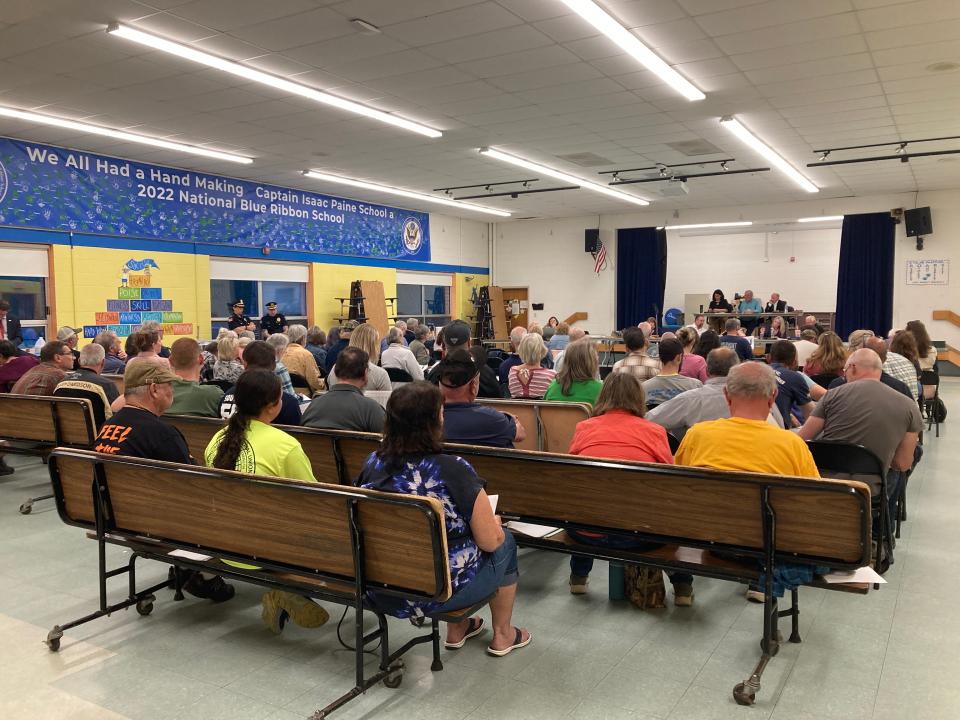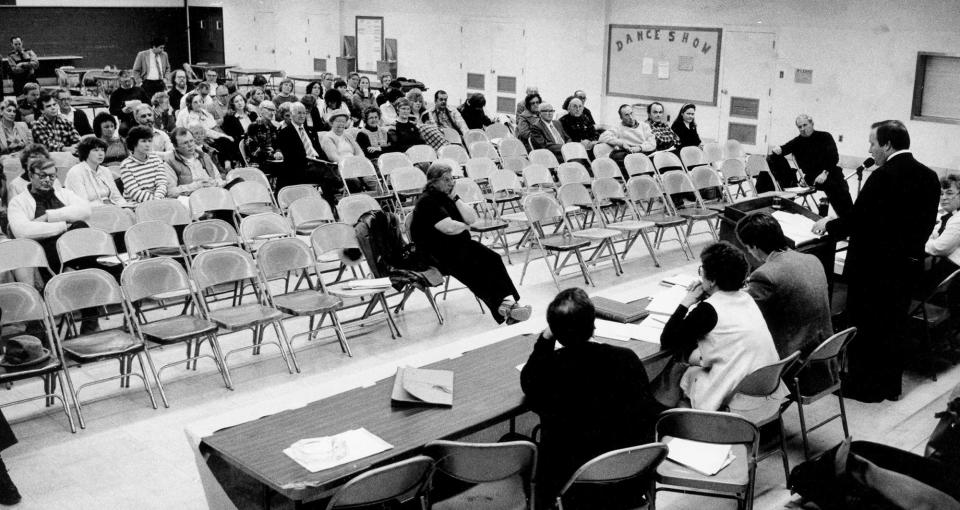Once the epitome of New England democracy, the Financial Town Meeting is fading in RI
When the herring are running, shadbush and forsythia are blooming, and signs advertising May breakfasts are popping up outside white clapboard churches, another rite of spring is around the corner: Financial Town Meetings.
But the centuries-old custom giving local voters final say over their town's budget and the ability to pass their own amendments is fading away.
Only nine Rhode Island communities still hold the annual May or June gathering to hash out spending for the coming year, according to an analysis by The Providence Journal.
That's less than half of what it was in 2002, when Rhode Island already had the lowest rate of Financial Town Meetings in New England.
And it could be even lower next spring, if Barrington decides to abolish what many see as an archaic form of governance that's easily hijacked by special interests.

To proponents, the Financial Town Meeting epitomizes democracy in its purest form – even though it historically excluded anyone who didn't own land. But advocates for good government see the perennially low turnout as concerning.
"It conjures up this platonic ideal of how self-government occurs in New England," said John Marion, executive director of Common Cause Rhode Island. "But in reality, participation is so low and it’s so prone to being captured by small, vocal minorities of residents that it’s really not egalitarian at all."
What does a Financial Town Meeting look like now?
It’s the first Tuesday in May, and 96 of Foster’s townspeople have gathered in the cafeteria at Capt. Isaac Paine School. Some are still in business casual or work uniforms, but most are informally attired in T-shirts, plaid button-downs, or jeans.
Registered voters are easily identified by their paper wristbands. Everyone else is sequestered off to the side at a table with child-sized seats behind caution tape that won't stay up.
The town's public safety budget is up for discussion. Dave Rathbun of Hartford Pike walks up to the microphone and proposes a $10,000 increase for the South Foster Volunteer Fire Company, which faces funding cuts.
"These are volunteers," he tells the crowd. "The fact that we’re even discussing this is kind of an insult to the fire department."
Town Councilwoman Heidi Rogers announces that she's going to say something that "may not be popular": The Foster Ambulance Corps dissolved two years ago, and since then, the town has been paying for South Foster Fire to use that building.
"I didn't think it was fair to have taxpayers funding expenses of a building that belonged to a defunct agency," she explains, before saying that she wants to bring up consolidation.
"Let's stay focused on this specific amendment that we're talking about," moderator Robert Boyden interrupts, polite but firm.
Up next is South Foster Fire Chief Gordon Brayton.
"You know we had no choice in how we handled that building and those rescues," he tells the council. "That has nothing to do with this budget cut. ... It's totally wrong. I'm sorry."
Rather than a chorus of "yeas" or "nays," the motion will be decided by paper ballots, Boyden announces. Voters shuffle to their feet, forming a line that snakes around the room. As they wait for the votes to be counted, old acquaintances strike up conversations about recent surgeries or plans to retire, and the gathering starts to take on the tenor of a reunion or church social.
Finally, Boyden announces the tally: 62 in favor, 28 opposed. The motion carries, and the firefighters get their money.
Repeat that process ad nauseam, and you have Financial Town Meeting in a nutshell. At any given moment it can be a heart-stirring display of civic engagement and direct democracy, or the most boring thing you’ve ever seen.
A history of exclusion
Each of the towns that still hold an annual FTM – Barrington, Exeter, Foster, Jamestown, Lincoln, Little Compton, New Shoreham, Scituate and West Greenwich – has its own way of doing things.
Broadly speaking; however, they follow a similar format: Town officials explain the budget they've proposed, and voters pick it apart – asking pointed questions, delivering impassioned speeches and making motions to add or slash spending.
The meeting doesn't end until electors approve the budget – which could take half an hour, or until midnight. Some FTMs have stretched out over multiple days.
To John A. Murphy, who's served as the elected moderator of Jamestown's FTM for the past 14 years, the classic Norman Rockwell illustration of men in suits and ties turning to listen to a blue-collar worker "really captures the spirit of the town meeting."
"It’s democracy," he said. "At least in Jamestown, it’s worked very well."
But the romantic ideal captured by that painting doesn't quite match the origins of the FTM in Rhode Island, which "was not developed as an inclusive or egalitarian practice," attorney Peter Skwirz observed in a 2016 article in the Rhode Island Bar Journal.

For about two centuries after the first town meetings began in the 1600s, only property owners could vote. That restriction was abolished in 1843 – but only partially. Until 1973, the Rhode Island Constitution required people to own real estate or pay taxes on personal property before they could vote on "any proposition to impose a tax or for the expenditure of money in any town."
After voting rights were expanded in the 1800s, towns began holding special meetings to discuss financial matters, which allowed them to still exclude everyone but taxpayers and property owners, Skwirz's article points out. The practice continued long after general town meetings, which were open to all voters, fell out of favor.
Today, of course, you don't have to own property to vote in an FTM. But critics say that the format is inherently exclusionary, since having a say on consequential decisions requires being in a specific place at a specific time, with the flexibility to potentially stay there all night.
"If you’re requiring physical turnout, you know in advance that it’s going to be a very small portion of the population that can or will participate," Marion said.
Meetings draw a tiny fraction of voters
In Barrington, which could be next to eliminate the FTM, turnout has ranged from 0.7% to 5% over the last 10 years, according to a July presentation by Town Manager Phil Hervey.
It's not hard to understand why.
"We would have 30 people coming to the microphone to all say the exact same thing about a $5,000 line item," said former gubernatorial candidate Ken Block, who serves on Barrington's Charter Review Commission. "That’s the nature of the thing, and while that’s quaint and very New England-sounding, it’s not a particularly great use of your time."
The commission, led by former state Rep. Joy Hearn, recently conducted a survey and found that 69% of residents said it was "extremely important" to be able to vote on the budget. However, 41% were "not at all satisfied" by the FTM process.
"Every year I want to attend, and every year I can’t make it," wrote one resident. "For a town that caters to parents with young families, it’s extremely challenging for those parents to make it to the meeting. As a result, I worry that the FTM is not representative of the town.”
The commission is now proposing to replace the FTM with an all-day referendum – essentially, a special election where voters approve or reject the budget. Other towns, including Charlestown and Glocester, have made a similar switch.
Elsewhere, town officials have been forced to lower the number of residents required for a quorum, or to beg voters to attend. In 2021, Exeter's budget was decided by a little more than 50 voters after a "considerable wait" for enough people to show up, the Town Council said in a notice urging residents to attend the following year.
During the pandemic, the General Assembly authorized towns to hold virtual hearings instead of traditional FTMs. But in Jamestown, nearly 200 people parked in a field and participated in a "drive-in" FTM, using flags to vote as the proceedings were broadcast over the radio.
Murphy, who presides over Jamestown's FTM, said between 100 to 700 voters typically show up – which translates to roughly 2% to 15% turnout. In his view, low attendance isn't a bad thing, but a sign that the Town Council did a good job putting together the budget.
The meetings also tend to be fairly efficient, he said, another indication that voters are satisfied.
"We’ve done some in 20 minutes," he said. "It's a great night to see your neighbors."
Decisions can take residents by surprise
The downside of low turnout: A relatively small group of voters can push through changes that the majority may not like.
"Sometimes you only need 15, 20 people to get something done," Block said. Residents impassioned by a certain hyperlocal issue – say, a turf field at the high school – often get the outcome they want by encouraging supporters to show up at otherwise sparsely attended meetings.
Crucially, FTMs aren't subject to the Open Meetings Act, which requires the public to be notified in advance about any votes that may take place at a government meeting.
Towns have to post a warrant letting people know that there will be a vote on the budget, Skwirz's article points out, but "need not give any notice of the plethora of actions that could be taken by the voters at the FTM."
In other words, townspeople may wake up the next morning and be shocked to discover that the library's budget was cut, or that the town is getting pickleball courts instead of a new fire truck.
Some communities require citizens to propose significant changes – anything over $10,000, for instance – in advance so that they can be posted with the warrant.
There's an irony to the fact that FTMs are falling out of favor, Marion pointed out. Experiments in "participatory budgeting," which invite residents to decide how to allocate certain funds, are taking place in a growing number of cities around the country – including Pawtucket, Providence and Central Falls.
"We’re coming back to this almost ancient form of government," he said. "But in a different way, in a way that is meant to encourage broader participation."
This article originally appeared on The Providence Journal: RI towns eliminate Financial Town Meeting tradition amid low turnout

